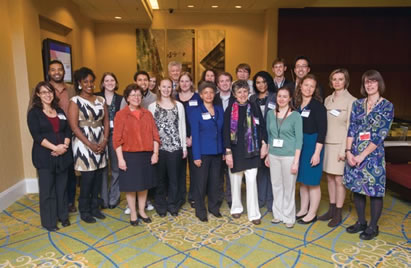
Founding director Mary E. Corcoran and others reflect on the program's success
When Mary E. Corcoran became program director of the Ford School's fledgling joint doctoral program 10 years ago, she didn't have a problem recruiting students.
They already were coming to her.
"For many years, all of us (at the Ford School) had been frustrated because we had students coming to us who wanted to do applied policy work in various departments," said Corcoran, who stepped down as program director this fall. She remains on the faculty as professor of public policy, political science, and women's studies.
"We knew there was an audience of people—a group of smart students who wanted more training in how to do good public policy within their disciplines."
The Ford School's joint doctoral program—in which candidates combine their public policy studies with disciplinary work in political science, economics, or sociology—remains a unique approach; just two other universities have similar models.
Former students and faculty credit the program's distinctive flavor to its longtime director.
"Mary was the institutional power of the program," said Scott Helfstein, a 2008 Ford School PhD graduate. "I couldn't imagine a better person, or better driving force, to build the program."
Helfstein, like many of the early PhD candidates, was studying elsewhere at U-M when he called Corcoran about joining the Ford School.
"All it took was one phone call," said Helfstein, who had been in the doctorate program of the political science department. "The Ford School became a great outlet for me to learn about policy process, and talk to other people that were interested in policy."
Seven of the Ford School's 12 inaugural PhD candidates were already enrolled in one of the other academic departments at Michigan, Corcoran said. "It just worked fine from day one. Michigan has extraordinarily strong social science departments, so they were already getting very good training, and the Ford School has people who do excellent policy research, so that worked with the students."
Helfstein said the Ford School prepared him "to understand both the substantive aspects of policy analysis, as well as the reality of how the sausage gets made." He is now director of research at the United States Military Academy at West Point's Combating Terrorism Center.
 |
|
Ford School PhD alums gathered in Washington, DC in November. |
The program's 38 graduates have had impressive success on the job market, earning tenure-track faculty positions; prestigious post-doctoral fellowships; and research posts with organizations such as Mathematica Policy Research, the Gates Foundation, the Federal Reserve Board, and the State Department.
As dean of the Ford School ten years ago, Rebecca Blank helped launch the program. She attributes much of the program's immediate success to Corcoran's intellectual breadth and engaging personality.
"When you are going to set up a new program, you have to persuade people to come to a PhD program that didn't exist and hasn't graduated any students," said Blank, currently the Acting Deputy Secretary of Commerce and Under Secretary for Economic Affairs.
"Mary has a very broad background: she can talk to economists, she can talk to sociologists, she can talk to political scientists, and understand something of all of those disciplines," said Blank. "In addition, she is just deeply committed to working with students."
"You have to be the sort of person that people get excited about coming to see and to work with. She was really able to do that."
Looking back, Corcoran is proud of the legacy she leaves behind after 10 years—and proud of the graduates' success.
"I believed in every one of my students," she said, "and every one of them proved me right."
Below is a formatted version of this article from State & Hill, the magazine of the Ford School. View the entire Winter 2012 State & Hill here.